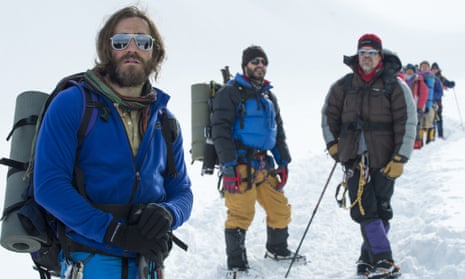Jon Krakauer, the journalist who survived the catastrophic 1996 expedition on Everest that resulted in multiple fatalities, and whose subsequent book Into Thin Air became a bestselling account of it, has criticised the recently released film of the disaster as “total bull”.
In an interview with the Los Angeles Times, to support the release of Prophet’s Prey, a documentary about religious sect leader Warren Jeffs who was sentenced to life imprisonment in 2011 for child sex abuse, Krakauer said of the Baltasar Kormákur-directed Everest: “It’s total bull … Anyone who goes to that movie and wants a fact-based account should read Into Thin Air.”
Krakauer, himself an experienced climber and a participant in the 1996 expedition on commission from Outside magazine, appears as a character in Everest, played by Michael Kelly. Krakauer said he had had no contact with Kelly, and the article reports he was particularly annoyed by a scene in the film in which his character refuses to help in rescue attempts after a request from Anatoli Boukreev (played by Ingvar Eggert Sigurðsson), one of the expedition guides.
Krakauer said: “I never had that conversation. Anatoli came to several tents, and not even Sherpas could go out. I’m not saying I could have, or would have. What I’m saying is, no one came to my tent and asked.”
Kormákur responded to Krakauer’s complaint in a statement to the LA Times. “Our intention in the tent scene that Mr Krakauer mentions was to illustrate how helpless people were and why they might not have been able to go out and rescue people … They were not malicious. They were helpless … The writers and I tried to look at things from a fair point of view without choosing sides.”
Krakauer, however, does accept one of the film’s suggestions: that his presence, and potential coverage in a major magazine, may have pushed one of the expedition leaders, Rob Hall, to take more risks. “They were taking chances trying to get clients to the summit because I was there.”
Krakauer revealed that the accident affected him for years afterwards – “I was … depressed and I didn’t even know it” – and has harsh words for the current wave of “Everest tourism”: “Everest is not real climbing. It’s rich people climbing. It’s a trophy on the wall, and they’re done … When I say I wish I’d never gone, I really mean that.”

Comments (…)
Sign in or create your Guardian account to join the discussion